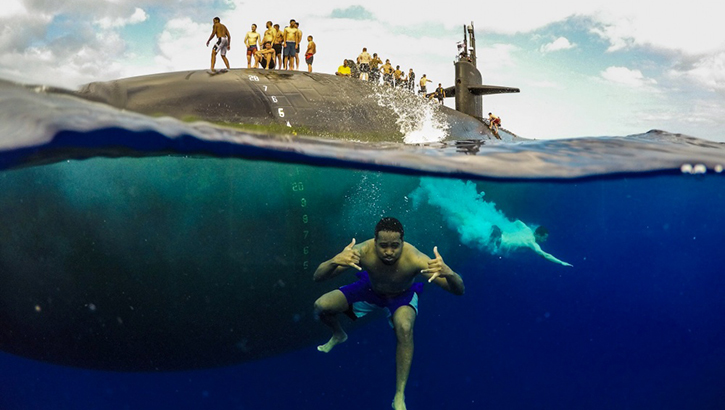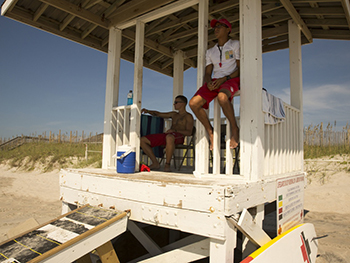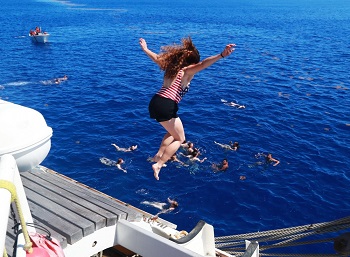Summer Water Safety Means: Know your Limitations
 Sailors assigned to the Los Angeles-class fast-attack submarine USS Olympia (SSN 717) participate in a swim call in the Pacific Ocean, July 31, 2018 (Photo by: Navy Fire Control Technician Senior Chief Vien Nguyen).
Sailors assigned to the Los Angeles-class fast-attack submarine USS Olympia (SSN 717) participate in a swim call in the Pacific Ocean, July 31, 2018 (Photo by: Navy Fire Control Technician Senior Chief Vien Nguyen).
Swimming in a pool, a lake, a pond, or an ocean is the height of cool summer fun but swimming also has its dangers.
Open waters with strong tides are risky for even the most experienced swimmers. The most placid pools can be very dangerous for young children. Alcohol always raises the threat level for swimmers.
And complacency of any kind creates potential problems around the water.
"The most important thing to remember is how unpredictable it can be." said Marine Staff Sgt. Houston Lindemann, senior non-commissioned officer in charge of beach lifeguards at Camp Lejeune, N.C.
"Always check the currents and weather conditions at the location you plan to swim," Lindemann said.
"Once you find that conditions are safe, check for the closest lifeguards to where you will be swimming. Swimming at beaches, lakes, or pools with lifeguards on duty is the best way to stay safe," he added.
 Marine lifeguards with Headquarters Support Battalion’s Beach Detachment, watch over the shore of Onslow Beach aboard Marine Corps Base Camp Lejeune in North Carolina (Photo by: Marine Cp. Jackeline Perez Rivera, Marine Corps Installations East).
Marine lifeguards with Headquarters Support Battalion’s Beach Detachment, watch over the shore of Onslow Beach aboard Marine Corps Base Camp Lejeune in North Carolina (Photo by: Marine Cp. Jackeline Perez Rivera, Marine Corps Installations East).
Jim VanHoesen, a lifeguard at Holloman Air Force Base, N.M., said: "You need to know the body of water and the shoreline."
VanHoesen suggested that another core precaution is "to get a formal training course in swimming for the entire family." The Red Cross provides many courses on swimming for beginners as do many base pools.
In the pool at Holloman, parents are told to watch out for their children at all times and not to count on the lifeguard as a babysitter. "We have an arm's length rule," VanHoesen explained: Adults always need to be within an arm's length of a child in case of trouble.
That rule exists because toddlers and children are silent drowners. They do not splash about or cry for help but go silently straight to the bottom. It all can happen in a matter of seconds.
What should you know before you jump into that inviting pool? "Always know the depth of the pool," VanHoesen said, and don't jump headfirst the first time. Know where the ladders and lifeguard stations are located.
 U.S. Coast Guard Academy Cadets and Coast Guard Tall Ship Eagle (WIX 327) crewmembers participate in a swim call in the Atlantic July 10, 2019 (Photo by: Navy Mass Communication Specialist 2nd Class Ruben Reed).
U.S. Coast Guard Academy Cadets and Coast Guard Tall Ship Eagle (WIX 327) crewmembers participate in a swim call in the Atlantic July 10, 2019 (Photo by: Navy Mass Communication Specialist 2nd Class Ruben Reed).
Before you even leave the house, VanHoesen said, bring provisions to "stay hydrated, bring sunscreen and layers of clothes should the weather change."
When swimming at beaches that do not have lifeguards, "it is extremely important to know your limitations," Lindemann said. "Do not do more than you are capable of. It is also important to know how to spot rips and tide changes when swimming at unguarded beaches," he added.
Rip currents "are strong, localized, and narrow currents of water that move directly away from shore, cutting through the lines of breaking waves like a river running out to sea," LIndemann explained.
If caught in a rip current, he offered this advice: The best practice is to relax and swim parallel to the shore until free from it. Do not tire yourself out by trying to swim directly back to the shore.
Here are some other tips to keep you and your family safe while in or near the water:
- Watch out for the "dangerous toos": too tired, too cold, too far from safety, too much sun and too much strenuous activity.
- Have a means of summoning help (such as a mobile phone) close by. Water emergencies often happen quickly and unexpectedly.
- Get trained in first aid, cardiopulmonary resuscitation (CPR) and automated external defibrillator (AED) use.
- Always swim with a partner, especially in open water.
- Never swim when you are tired, under the influence of alcohol, drugs, or medication.
- Observe all posted warning signs.
- Do not run around the pool deck; it is wet and likely slippery.
- Do not let children roughhouse or play underwater breath-holding games.
- Watch the weather and stay out of the water during thunderstorms.
- Always make young children, inexperienced swimmers, and non-swimmers wear U.S. Coast Guard-approved life jackets whenever they are in, on, or around the water.
- Fence pools and spas with adequate barriers to prevent unsupervised access.
- Teach children to stay away from pool drains and other openings that create suction, which could lead to drowning.
- Know what kinds of animals are in the water with you and which to avoid.